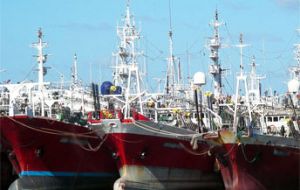MercoPress. South Atlantic News Agency
Argentina: Uncertainty ahead of 2011 squid season
 Jigger vessels moored in the port of Mar del Plata.
Jigger vessels moored in the port of Mar del Plata. The limited presence of squid (Illex argentinus) at mile 201, outside the exclusive economic zone (EEZ) is of concern to the local squid jigger fleet, which fear that something similar might happen this year in national waters.
Fishing vessels near the eastern limit of the EEZ, caught just two tonnes per day which was dominated by small squids less than 60 or 70 grams in weight.
According to Guillermo de los Santos, president of the Chamber for Jigger Fishing Shipowners of Argentina (CAPA), around 17 Chinese and 15 Korean ships that have fishing licenses from the Falkland Islands, were “catching very little, but more importantly, destroying stocks of the resource,” reports Pescare.
On the one hand, this lack of Illex endangers the possibility that China's fleet will operate in Argentine ports, under a recent agreement between the two countries.
The businessman said that there is information showing that the boats will leave for the Asian Pacific in search of the Peruvian giant squid (Dosidicus gigas), an alternative to the Argentine squid.
On the other hand, this situation creates uncertainty about the 2011 harvest in the national platform that begins in February after two seasons with landings declining.
During 2010, Argentine ports received 84,409 tonnes of squid, while the previous year 71,414 tonnes were landed. Both volumes are very far from the 255,000 tonnes harvested in the 2008 season.
In addition, unions and infrastructure disagreements prevented the National Institute of Fisheries Research and Development (Inidep) to carry out the research campaign for 2010, so the uncertainty is even greater.
In this regard, the representative of the shipowners complained that the fleet has been left to operate “blind”.
However, de los Santos acknowledged that the price of the cephalopod remains stable above the low usually experienced at the beginning of each season.
According to official reports, the value of a tonne of squid reached USD 2236 during November last year, representing an increase of 90.1 per cent over the same period in 2009, a year marked by crisis.
The problem for the Argentine businessmen is that the country “does not have a competitive dollar.” Therefore, the sector finds it difficult to grant wage increases, as requested by the unions.
However, the president of CAPA said they are negotiating with captains and representatives of the Maritime Workers Union (SOMU) to sign an agreement.
The leader also sought support from the national state in order “to be sustainable.”
“They talked about removing retentions, but we do not have anything yet,” he said. (FIS)




Top Comments
Disclaimer & comment rules-

-

-

Read all comments” ... around 17 Chinese and 15 Korean ships that have fishing licenses from the Falkland Islands, were “catching very little, but more importantly, destroying stocks of the resource,....”
Jan 10th, 2011 - 08:54 am 0Now who are they complaining about? The Chinese? The Koreans? Or ...... ??
Wouldn't be Argentine overfishing of course :-)
TWIMC
Jan 10th, 2011 - 10:08 am 0Nobody knows for certain how much each side fishes or overfishes….
Nearly impossible for both sides to effectively control what the foreign fleets “really” catch.
The only thing we know for certain is that the stocks in the South Atlantic are fast becoming non commercial for those fleets.
And, as we know that:
Fishing amounts for 0.4% of the Argentine GDP (Malvinas “area of influence”: +- 0,1%)
And
Fishing amounts for 60% of the Malvinas GDP
It is easy to see who is being hit hardest.
Think - it appears this guy is now blaming others (the islanders once again). Is this a national obsession to balme others Argentina's internal or economic problems?
Jan 10th, 2011 - 11:24 am 0This is after all you have said about purposefully over fish to ruin the FI economy. Argentina, such a responsible and peaceful nation?
If the Islands fishing industry does decline then all the more impetus for more hydrocarbon exploration so the Islands can diversify their economy.
Either way, blaming the Islands for damaging the squid stocks shows how much of an imbecile this guy is, when Argentina lifted quotas!
When will Argentina grow a pair and start to behave like adults?
Commenting for this story is now closed.
If you have a Facebook account, become a fan and comment on our Facebook Page!